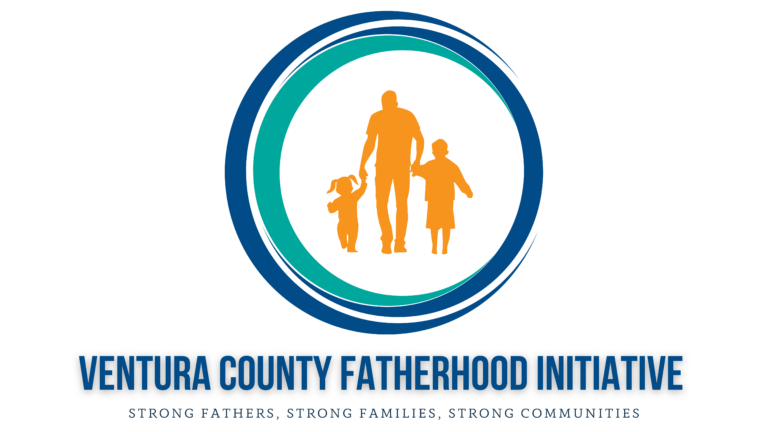Ventura County Fatherhood Initiative

The core purpose of the Ventura County Department of Child Support Services is to help families thrive. We are committed to achieving this goal by supporting fathers in playing a significant role in their children’s lives through our Fatherhood Initiative. Our initiative is designed to enable fathers to overcome barriers and reach their full potential, resulting in positive outcomes for themselves, their children, and our community.
Our Fatherhood Initiative aims to implement father-friendly practices across Ventura County’s family-serving agencies and organizations and eliminate obstacles that hinder fathers from actively engaging in their children’s lives. By supporting fathers in reaching their full potential, we not only empower them, but also build a stronger foundation for their children to flourish. Ultimately, by positively impacting individual families, we uplift our entire community.
Why Fathers?
The US Census Bureau (2022) reports that 1 in 4 children, are growing up without a father in the United States.[1] According to research, the future of these children is impacted in the following ways:
- Poverty – 47% more likely to live in poverty.[2]
- Teen Pregnancy – 71% of pregnant teens have uninvolved fathers.[3]
- Behavioral Disorders – 85% of all children who show behavior disorders come from fatherless homes.[4]
- Drop out of school – 71% of school dropouts come from fatherless homes.[5]
- Substance Abuse – 71% percent of all children who abuse substances come from fatherless homes.[6]
- Prison – 85% of youths in prison don’t have a present father.[7]
- Suicide – 63% of all youth suicides are from children from fatherless homes.[8]
These examples demonstrate that ways children are impacted by the absence of their fathers. The negative impact for children raised without fathers extends beyond the few examples provided, and it affects our community.
How is Ventura County Doing?
- 25, 757 children in our county are living with only their mother in the household (no spouse/partner present).[9]
- 22, 147 children live below the poverty line.[10]
- The teen birth rate between 2018 and 2020 was 11.3 per 1,000.[11]
- From 2020 to 2021, Ventura County Behavioral Health served approximately 16,169 clients, including 6,144 minors.[12]
- 98,422 adults in our county don’t have a high school diploma.[13]
- In 2021, there were a total of 33,343 arrests, including 1,388 minors.[14]
- From 2018 to 2020, the overall suicide rate ranged from 10.2 to 12.4 per 100,000. The rate for ages 15-24 was 6.6 per 100,000.[15]
The Power of Fatherhood
According to the National Fatherhood Initiative (2019), research indicates that involving fathers in their children’s lives yields positive results.[16] When fathers take an active role, their children are less likely to:
- Experience infant mortality
- Have low birth weight
- Emotional and behavioral problems
- Experience neglect and abuse
- Grow up in poverty
- Experience obesity
- Become pregnant as a teen
- Drop out of high school
- Have substance abuse issues
- Be incarcerated as a juvenile
- Commit crimes
- Commit suicide
The data proves father involvement is crucial in shaping the outcomes of children, therefore contributing to the overall well-being of our community. Promoting father involvement and empowering them to participate in their children’s lives serves as an effective strategy to mitigate the social issues in our county.
Our Goals
By removing barriers and providing support for fathers, our Fatherhood Initiative strives for the following outcomes:
- Implement father-friendly practices across Ventura County’s family-serving agencies and organizations
- Promote responsible fatherhood
- Improve father-child relationships
- Enhance parenting skills and knowledge
- Improve family functioning
- Promote personal, social, and economic growth
- Strengthen the connection and involvement between fathers and their community.
Overall, we strive to empower fathers to become more engaged, responsible, and nurturing parents, while also supporting their personal growth and connection to their families and communities.
Our Plan
Through our Fatherhood Initiative, we strive to remove barriers for fathers in the following three ways:
- Formation of a Fatherhood Collaborative
- Establishment of a father support group and educational workshops
- Develop father-focused events
Fatherhood Collaborative
Our Fatherhood Initiative will encourage and implement father-friendly practices across Ventura County’s agencies and organizations with the creation of the Fatherhood Collaborative. The Fatherhood Collaborative will be a partnership between community organizations, schools, and county agencies to evaluate the level of inclusion for fathers within family-oriented services and identify how they can be tailored to improve father engagement. The initial meeting will center on having each representative conduct a self-assessment to gauge their agency or organization’s level of father-friendliness. We will explore ways to tailor services and outreach for fathers, to enhance outreach and engagement for fathers in Ventura County.
After establishing the father-friendly principles for Ventura County, subsequent meetings will feature a representative from each agency or organization showcasing their services to the Fatherhood Collaborative and illustrating the changes their organization has made to support fathers. Additionally, the meetings will feature guest speakers who advocate for father inclusion and provide trainings to the collaborative members and employees of family-oriented service providers. The trainings will highlight the importance of increasing father engagement and father involvement, and how to increase both in the collaborative member’s respective agencies.
Father Support Group and Workshops
We will also provide services directly to fathers. When available, we will connect fathers to existing support groups and educational workshops. Additionally, we plan to create a support group and educational workshops specifically for fathers. The support group will allow fathers to have a safe space to discuss issues that affect them and are important to them. This space will also allow fathers to share their fatherhood experiences, learn from each other, uplift each other, and provide networking opportunities. The educational workshops will provide fathers the opportunity to enhance their personal and parenting skills.
Our plan is to collaborate with the partners we have established through the Fatherhood Collaborative and our community to develop support groups and educational workshops that cater specifically to fathers. In cases where such programs already exist, we will work to enhance and customize them to better address the needs of fathers.
Example of potential workshops include Bootcamp for New Dads, financial budgeting, mental health management classes, parenting classes, CPR training, and cooking classes.
Develop Father-Focused Events
Through our Fatherhood Initiative, we plan to develop events specifically aimed at supporting fathers. These events will offer fathers the opportunity to connect with each other, engage with our community, learn about local resources, and become more involved in their children’s lives.
References
Reference 1 (Webpage): The Father Absence Crisis in America. (n.d.). Fatherhood Initiative.
Reference 2 (Webpage): The Fatherhood Factor and Childhood Poverty. (n.d.). Fatherhood Initiative.
Reference 3: Research and Statistics — Rochester Area Fatherhood Network. (n.d.). Rochester Area Fatherhood Network.
Reference 5 (Webpage): Father Facts. (n.d.). All Pro Dad.
Reference 7 (Webpage): Statistics. (n.d.). The Fatherless Generation.
Reference 8 (Webpage): Suicide Prevention Awareness. (2019, November 5). Fathers & Families Center.
Reference 9: U.S. Census Bureau (2021). Household type for children under 18 years in households
Reference 10: U.S. Census Bureau (2021). Poverty status in the past 12 months.
Reference 13 (Webpage): U.S. Census Bureau (2021). Educational attainment.
Reference 15: Youth Suicide Rate. (n.d.). KidsData.



